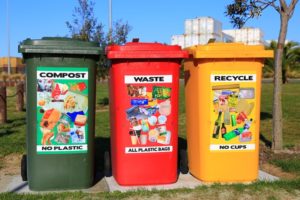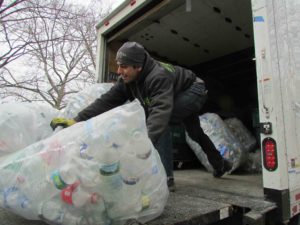Zero waste is one of the most effective strategies we have for creating a more sustainable environment. Preventing packaging, products, and used items from being thrown out helps to minimize landfill, conserve natural resources, and prevent unnecessary pollution in the local area.
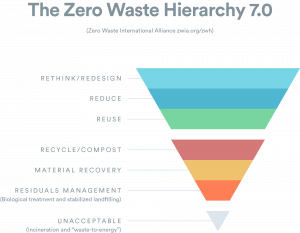
Source: zerowaste.com
Although incredibly effective, a zero-waste approach is not always easy to achieve. Whether implemented by businesses, organizations, or individuals, removing waste from the loop takes thought, commitment, and, more often than not, significant changes to our habits.
These habits begin with the design and manufacture of less wasteful products and innovative materials that can be reused in a loop or naturally biodegrade. This moves through the reduction, reuse, and repair of products to keep them in the cycle for as long as possible.
However, one waste stream that presents numerous challenges is food waste. Food waste is a huge issue in the US, and dealing with it effectively through recycling is only one way in which we can reduce the environmental impacts this waste stream creates. Thankfully, the zero-waste approach has alternative options that allow us to reduce waste in a variety of ways.
As part of the recycling process, zero waste is inextricably linked with composting, providing an efficient and entirely natural way to process organic waste. Although not exclusively a zero-waste solution, composting represents a key component of the zero-waste hierarchy, helping to significantly reduce the volume of organic waste that ends up in landfill.
Understanding the differences and similarities between zero waste and composting gives us a better idea of the holistic approach zero waste takes to managing food waste and other organics. Here, we explore how the two are intertwined and why composting is so important for both consumers and businesses.
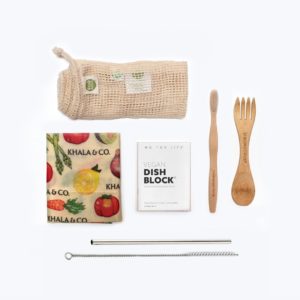
Source: zerowaste.com
What is zero waste?
According to the Zero Waste International Alliance, zero waste means “Designing and managing products and processes to systematically avoid and eliminate the volume and toxicity of waste and materials, conserve and recover all resources, and not burn or bury them.” Essentially, it means avoiding disposable items and reusing products wherever feasible.
Reducing and conserving materials is considered best practice according to the zero-waste hierarchy. This is because it reduces the volume of waste that ends up in landfill, minimizes the need for new materials to be consumed, and saves energy that would otherwise be used in the manufacturing process.
However, it’s worth remembering that zero waste is a journey rather than a destination, and making even incremental changes as you or your business work towards waste reduction can have a significant impact on the environmental impacts associated with our existing levels of consumption and disposal. Composting food waste and organics is an example, and among the easiest ways to reduce waste.
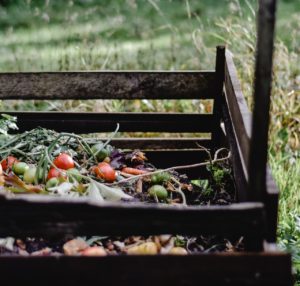 Zero Waste and Composting
Zero Waste and Composting
Zero waste and composting are closely associated, often used by individuals and companies looking to reduce the amount of organic waste that goes to landfill. However, composting lies further down on the zero-waste hierarchy as there are more efficient alternatives available. As a result, the purest interpretation of zero waste aims to keep trash out of everything, even the compost pile.
Preferably, using a truly zero-waste approach, leftover food should be eaten or donated to charity. Working on better planning to reduce food waste is also preferable to composting from a zero-waste perspective. This is especially true when talking about large organizations that can potentially produce high levels of compostable waste if proper planning isn’t implemented.
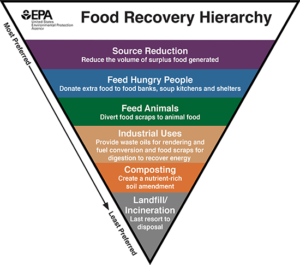
Source: epa.gov
Municipal Solid Waste (MSW) and Domestic Composting
The Food Recovery Hierarchy puts methods of dealing with food waste in order of preference with source reduction the best option and landfill the worst. This applies to both domestic and largescale composting.
Food Recovery Hierarchy
- Source Reduction — Reduce the volume of surplus food generated
- Feed Hungry People — Donate extra food to food banks, soup kitchens, and shelters
- Feed Animals — Divert food scraps to animal food
- Industrial Use — Provide waste oils for rendering and fuel conversion and food scraps for digestion to recover energy
- Composting —Create a nutrient-rich soil amendment
- Landfill/Incineration — Last resort for food disposal
MSW composting presents some challenges because it involves processes that can contribute to environmental pollution and waste. For example, collecting large volumes of MSW, and running commercial facilities to deal with the waste, can produce harmful emissions that impact the environment.
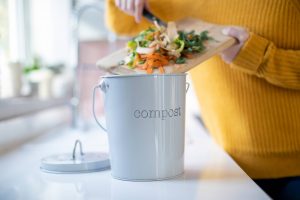 Is Composting Part of Zero Waste?
Is Composting Part of Zero Waste?
Although composting shouldn’t be necessary if a “perfect” zero waste approach is implemented, the reality is that it’s impossible to avoid some level of waste generation. For example, food scraps that cannot be eaten (by either humans or animals) and garden waste simply cannot be avoided, meaning proper composting is the most efficient way to deal with this type of waste.
On the plus side, composting delivers benefits over other forms of recycling and is a completely natural process that can be practiced by anyone and at any scale. Composting puts nutrients back in the ground and prevents biodegradable waste from ending up in landfill, representing one of the truly circular methods of waste management we have today.
Combining zero waste and composting policies should help organizations, businesses, and individuals to dramatically reduce the amount of organic waste sent to landfill. It will also ensure that food waste is disposed of responsibly and as much environmental value is extracted from the waste as possible.
How to Achieve Zero Waste
Although achieving zero waste may not be possible for many homes, businesses, and organizations at the moment, working towards zero-waste goals will still help to minimize the amount of trash that ends up in landfill. In zero waste living, composting plays an important part in diverting waste away from landfill and helping the environment. Adopting this approach will also help to change habits and make more people aware of the benefits of zero waste.
Make it Convenient
As most people are aware, changing the habits of a lifetime is a challenge. Convenience is key, so for businesses looking to minimize the amount of food waste that ends up in the trash, place a zero-waste compost bin next to the trashcan.
Having a zero-waste food composter in plain view, with comprehensive guidance on what can and can’t be disposed of, should ensure that everyone in your household, business, or organization follows the rules.
If space in your home or office is at a premium, you can also look into a zero-waste composting machine or a bokashi system. These innovative systems allow you to turn food waste into fertilizer even in the most confined spaces. Additionally, reaching out to local community composting initiatives can be a viable outlet for food waste and other organics, literally turning your waste into black gold for the direct benefit of your community.
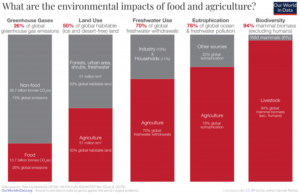
Source: ourworldindata.org
Boost Awareness
In many cases, zero-waste policies fall short because people either aren’t aware of the importance of a zero-waste approach or because they don’t know how to begin the zero-waste journey. Educating people about the importance of zero waste together with compost bins can help to significantly boost participation in these programs and help homes and businesses reduce the amount they throw away.
In addition, highlighting the massive amounts of resources required to produce our food will help people better appreciate its value. Put simply, with one-quarter of the world’s greenhouse gas emissions created by our existing food production systems, carelessly wasting good food is among the most damaging habits we currently tolerate.
Use Professional Services
If you run a business or organization that produces large amounts of compostable material, you may need to look beyond small-scale solutions. While things like a zero-waste kitchen compost bin will help to reduce the amount of food thrown away in staff kitchens and domestic homes, it’s a less viable option for bigger businesses.
This is particularly true in cities such as New York where state legislation mandates the use of professional haulers to divert organic waste from landfill, with monitoring and diversion metrics required to ensure compliance with the city’s aspirational zero waste goals.
For more information on zero waste, and how your business can work towards minimizing its waste output, subscribe to zerowaste.com today or speak to one of our TRUE advisors for advice on your specific requirements. Additionally, stay tuned to the blog for the very best insights on everything zero waste!


